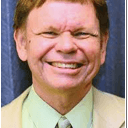A Chatty, Loving God Whose Word Echoes throughout the Universe and Holds the Cosmos Together
The Prologue to John’s Gospel was probably a separate poem or hymn which the writer adopted in order to begin the Gospel with his central theme—to get his audience to believe that Jesus is Messiah, the Son of God (20:31). Of course, this famous text begins with reference to the Logos (translated Word) who is said to be eternal and with God (vv.1-2), and He is said to be Creator, a light shining in the darkness (vv.3-5; light seems to be related to life or divine life in v.4, what promotes self-understanding [Rudolf Bultmann, Theology of the New Testament, Vol.2 pp.17-18]). Later we are provided with an account of the testimony of John the Baptist to the Word/Light (vv.6-8,15). Next, the Word’s presence among us in the world receives testimony (vv.9ff.). He is designated as the Father’s only Son (vv.14.18), a giver of grace, and the One who makes the faithful children of God (vv.16,12), who makes God known (v.18).
Borrowing this message from a previously-circulating song, the Johannine writer was not the first to attribute the status of Logos to Jesus. Indeed, the Neo-Platonic Jewish philosopher Philo had spoken of the Logos as an intermediary between God and the cosmos/universe. Of course, early Christians agreed, but wanted to claim a more elevated status for Jesus, and so began to say that He was more than an intermediary with God, but God Himself (v.1). We’re hinting here at the Trinity, but what sense does that make? In a sermon on this text, Martin Luther helps us understand. He claimed that nothing represents the condition of someone’s heart better than his words. If you have somebody’s word, you have them. And so, God’s Word is God Himself (Complete Sermons, Vol.1/1, p.173). God likes to chat. Has been doing it forever (v.1).
Logos was also used by the Greeks and ancient Stoic philosophers to make clear that the cosmic process was rational, kind of like the rational character of the human mind. Don’t we marvel sometimes at how magnificent the created order is, that it all sticks together? For Christians who like the Johannine writer say that Christ created it and that creation reflects the Logos (who is Christ) this entails that Christ is what holds it all together, and keeps the multiverse from collapsing into itself in another Big Bang. How wonderful to think of Christ as in the stuff of the universe, as their glue! It entails that we are meeting Jesus and God in every encounter and gaze every day and every moment. Wow!
The final verses of the lesson refer to the work of the Word on earth in the man Jesus, which was a further manifestation of God’s ongoing care for His Creation, and His efforts to renew it. As Luther says in a sermon on this text:
Hence God does not merely create, but whatever He created He also preserves…until the time He Himself has appointed… Thus, as human beings we did not create ourselves, so we can do nothing at all to keep ourselves alive by our own power. The fact that I grow and develop is God’s work alone. (Luther’s Works, Vol.22, pp.27-28)

Mark Ellingsen is a member of the NC Synod clergy roster, but he has served three decades in Atlanta on the faculty of the largest Historic Black Seminary in the country, the Interdenominational Theological Center. Named for his accomplishments and numerous media appearances to Marquis’ Who’s Who in America, this former parish pastor and ELCA seminary professor (Luther Seminary), also served six years at a theological think-tank in France for the Lutheran World Federation, is the author of 27 books and over 400 articles, most recently Sin Bravely (Continuum), Finding Peaks and Valleys in a Flat World (Vernon Press), and new this fall, Racism in the Mind: How Faith and Evolution Move Us to Challenge Racial Idolatry (New City Press).
To Consider
1. How can the Word of God still be God? How can Jesus be divine?
2. What does it mean to say that Jesus is Word of God? What difference does that make in everyday life?
3. How do we Christians view creation differently from others because we believe Christ made them and still preserves them? Does this make us look at Jesus’ saving work a little differently? And if so, how? What do all these issues have to do with the images of light and darkness?
Prayer
Glorious Lord Christ: secretly diffused and active in the depths of matter,...it is You to whom we cry out with a desire as vast as the universe, “In truth You are our Lord and our God.” Lord, lock us up within You. Make this belief so strong as to become one of the supports of our inner lives… For nothing, Lord Jesus, can exist outside of You.
—Pierre Teilhard de Chardin. (famous modern Catholic scientist and theologian)
